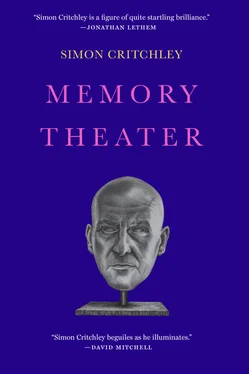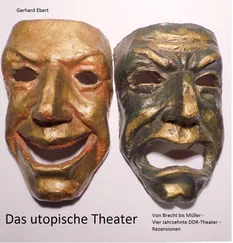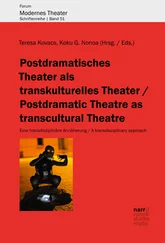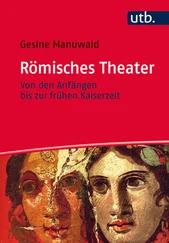a partial glossary of potential obscurities
A1124
An “A” category, single carriageway road that connects the towns of Colchester and Halstead, both in Essex, England.
JEAN BEAUFRET(1907–1982)
French philosopher, notable for his prominent role in the French reception of Heidegger’s thought.
JAMES BROWN(1680–1748)
Citizen of Earls Colne, Essex, England.
GIULIO DELMINIO CAMILLO(1480–1544)
Italian philosopher, known widely for his memory theater, which was described in the posthumously published l’Idea del Theatro .
TOMMASO CAMPANELLA(1568–1639)
Important Italian philosopher best known for his utopian treatise The City of the Sun .
THOMAS CARLYLE(1795–1881)
Hugely influential Scottish philosopher. Sartor Resartus (1836) is a scathing and immensely funny satire on German idealism and a fascinating philosophy of clothes.
CARNEADES(214–129/8 BCE)
Skeptical philosopher and head of Plato’s Academy. He was known for his very loud voice.
CHRISTINA THE ASTONISHING(1150–1224)
Christina Mirabilis from Sint-Truiden (now in Belgium), who was miraculously revived at her funeral and continued to perform wonders, such as levitating, surviving fire, and surviving drowning. She lived for nine weeks by drinking only the milk from her own breasts.
C.H.Z.
Continuously Habitable Zones (2011), an artwork by French artist Philippe Parreno (1964–) that figures subliminally in Memory Theater .
JOHN DEE(1527–1609)
Mathematician, navigator, proponent of English expansionism, adviser to Queen Elizabeth I, and Hermetic philosopher.
DUNDONIAN
Inhabitant of Dundee, Scotland.
THE FALL(1976–)
A mighty pop combo from Manchester, England, led by Mark E. Smith (1957–).
MARSILIO FICINO(1433–1499)
Founder of the Platonic Academy in Florence, translator into Latin of the complete works of Plato and coiner of the expression “Platonic love.”
ROBERT FLUDD(1574–1637)
Astrologer, mathematician, and cosmologist, whose memory system may find an echo in the architecture of Shakespeare’s Globe Theatre.
FRANCES THE CAT(1995–2014)
Elegant, beautiful, and fastidiously small, Frances was part Oriental, part mongrel, and her good looks were a result of that fortunate combination. Born in Sydney, she emigrated to New York and liked the city. She adapted quickly, spending a number of nights on the tiles, but looked no worse for it. She could be tough on her prey, whether large pigeons, frogs, or lizards. Frances had no time for dogs, or indeed other cats. She proved that refinement is compatible with immense affection and warmth. The protagonist fuses Frances with the cat Jeoffry, the dedicatee of Christopher Smart’s poem Jubilate Agno , composed during confinement for insanity in London between 1759 and 1763.
FULKE GREVILLE(1554–1628)
1st Baron Brooke, poet, biographer of Sir Philip Sidney, adviser to Queen Elizabeth I and King James I. Stabbed to death by Ralph Heywood, his servant.
GREEN MAN, OR JACK-O’-THE-GREENS
A vegetative deity, a symbol of rebirth, usually depicted as a head peering through foliage. Very often the name given to public houses in England and, by association alone, the name of an excellent brewery in Bury St. Edmunds in Suffolk.
GREENE KING
Renowned for their Abbot Ale.
GRIOT
West African storyteller and bardic singer.
MICHEL HAAR(1937–2003)
French philosopher with astrological leanings. Much of what is said about him above is true. Some of it isn’t.
HADEWYCH OF ANTWERP(?–1248)
Beguine visionary from Brabant, and perhaps the most profound poet of divine love.
MICHEL HENRY(1922–2002)
An as yet under-recognized French philosopher and novelist, author of a fascinating two-volume study of Marx, a genealogy of psychoanalysis, and a philosophy of Christianity. Henry was a philosopher of life conceived in terms of radical immanence and interiority.
HERMES TRISMEGISTUS
Hermes the Thrice-Great, who was believed to be an Egyptian priest, a contemporary of Moses, and author of the Corpus Hermeticum . In the early seventeenth century, these texts were dated to no earlier than the second or third century of the Common Era, although the identity of their author remains unclear.
’S-HERTOGENBOSCH OR DEN BOSCH
“The Duke’s Forest,” a once enormously powerful trading center from the thirteenth to the sixteenth centuries and home to the artist Hieronymus Bosch (1450–1516). The city’s fortunes collapsed during and after the Dutch War of Independence (1568–1648). It remains a beautiful and rather haunting place.
DOMINIQUE JANICAUD(1937–2002)
A French philosopher of great importance, whose work is yet to be allotted its true importance. Janicaud wrote books on Félix Ravaisson, Hegel, and Heidegger as well as developing an entirely novel approach to rationality and a philosophy of time. The final work completed in his lifetime was an introduction to philosophy written for his daughter, Sophie. He was a man of great patience, good humor, and refinement. He was the protagonist’s maître and the person through whom he met Michel Haar.
“JEDER ENGLANDER IST EIN INSEL”
“Every Englishman is an island,” a saying of the German romantic poet and mining specialist Novalis (1772–1801).
JILTED JOHN
The name of the first alter ego of Graham Fellows (1959–), an entertainer from the north of England. “Going Steady/ Jilted John” was released in July 1978 and reached number four in the UK charts. Other alter egos followed, notably John Shuttleworth, composer of the unforgettable “Pigeons in Flight.”
H. D. F. KITTO(1897–1982)
Humphrey Davey Findley Kitto, a British classicist of great renown and author of The Greeks (1951), among many other works.
SARAH KOFMAN(1934–1994)
A prolific French philosopher, who wrote with great distinction on Freud and Nietzsche. She was appointed to a chair at the Sorbonne in 1991 and committed suicide three years later, on the 150th anniversary of Nietzsche’s birth.
MARTIAL, AKA MARCUS VALERIUS MARTIALIS(38/41–102/104)
A Hispanic poet who lived in Rome and is known for his twelve volumes of epigrams, which are often very saucy and rather amusing.
GUY DE MAUPASSANT(1850–1893)
French writer and acknowledged master of the short story form. His 1887 story “Le Horla” is a work of unforgettable terror. Please read it.
METRODORUS(145 BCE — 70 BCE)
From the town of Skepsis in ancient Mysia, in Anatolia. He was known for his prodigious memory and his hatred of the Romans.
PICO DELLA MIRANDOLA(1463–1494)
Student of Ficino and philosophical meteor whose syncretic metaphysics drew on a dazzling array of sources, some of them Hermetic, Zoroastrian, Orphic, Pythagorean, and Cabbalistic. He ran into trouble with the Pope and died in suspicious circumstances, possibly poisoned by his secretary.
HENRI MONGIN
As far as I am aware, he did not exist.
PETHIDINE
A once-popular opioid of the phenylpiperidine class, for the treatment of acute pain, whose effects are often compared to those of morphine.
Читать дальше












